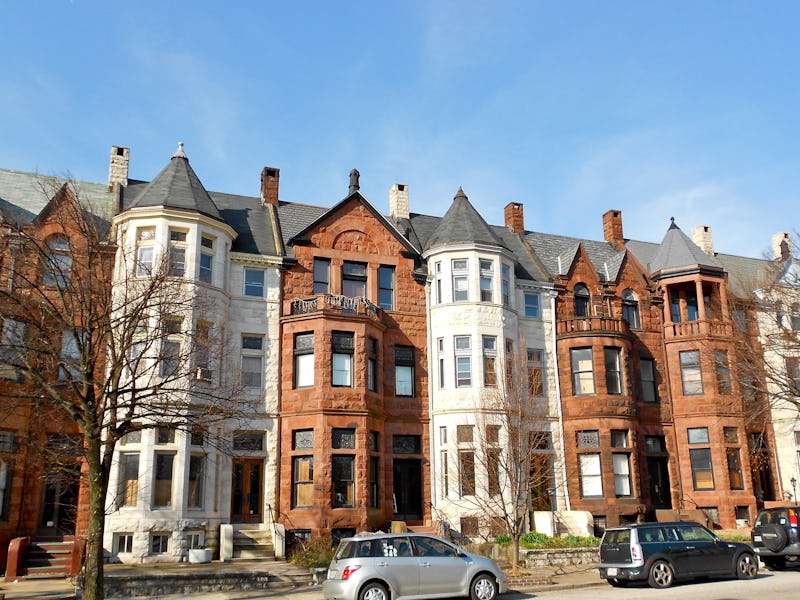"Community Solar" Might Power America's Old Houses
"We are finding the best roofs in the country to host your panels."

On Friday morning, U.S. Secretary of Energy Ernest Moniz was in East Baltimore at the home of Michelle Williams for a press event to bring attention to solar energy. Moniz captioned a photo of himself and Williams, “Clean energy is for everyone.” Between the lines of that tweet was this message: East Baltimore is a world away from the made-for-TV mansions in sun-soaked Southern California, where Elon Musk recently showed off his Tesla solar roof tiles — but it shouldn’t be.
“ZIP codes should never determine destinies,” Labor Secretary Tom Perez said during a panel later in the day, which was part of the White House Clean Energy Savings for All Summit at nearby Morgan State University.
Unlike Williams, millions of Americans live in buildings or homes that aren’t prepared for solar installations. Adoption faces not only a wealth hurdle, but a technological one, too.
Even as the use of solar energy has grown, it still only makes up less than one percent of the country’s energy use and just one percent of Americans have rooftop solar. Many who would install solar can’t because they don’t own their homes, their roofs aren’t the right design, or simply because cost or legal barriers are too high.
Enter Arcadia Power, the renewable energy company that this month introduced a solar power-buying plan for renters and others who can’t mount solar panels — but could sponsor them elsewhere.
“We are finding the best roofs in the country to host your panels, and the process, building more solar power and supporting renewable energy,” says Kate Henningsen, director of community solar for Arcadia, in a video introducing the service.
Using a software integrated with over 100 different utility billing systems, Arcadia offers consumers the option to save money on their power bills by buying a subscription to renewable energy certificates from a partnered provider. Renewable energy certificates (RECs), which can represent the value of $.005 up to $.03 per kilowatt depending on the provider, are accredited through a federally regulated regional tracking system. According to the World Resources Institute, the number of utility providers who have incorporated RECs into their utility programs with no additional cost to customers has doubled in the past year.
“We started the company because we wanted to give the customers a choice,” Arcadia CEO Kiran Bhatraju tells Inverse. “When customers make the decision to go solar, they take charge of their energy use.”
Right now, the company has partnerships with solar installations in California, Massachusetts, and Washington, D.C. While homeowners might be limited to rooftop solar, Arcadia is able to partner with larger ground installations and commercial roof installations. Partners are incentivized by getting a “small part of the production,” Bhatraju says.
“We source our projects in the best states, where there are great incentives,” Bhatraju says. “We keep an eye on that and how those markets change.”
Right now, 16 states and D.C. offer incentives to homeowners and businesses to encourage solar generation. Subsequently, prices for solar RECS have become more competitive than other types of renewable energy.
Whereas companies like Tesla aspire to expand the number of rooftop owners, the market Arcadia is focused on is the reverse.
“We’re really targeting people who live in apartments and those with flat roofs, the markets that aren’t traditionally available,” says Bhatraju. “If you have a roof and it’s self-facing you should get a panel.”
Right now consumers pay a small fee for the service, but Bhatraju thinks that as the service expands they will eventually be able to offer subscriptions for consumers at no overhead. Arcadia is a member of the National Community Solar Partnership, an initiative to further the White House’s goal to develop one gigawatt of low moderate-income solar by 2020. According to the White House, currently more than 120 housing authorities, rural electric co-ops, power companies, and other organizations have committed $287 million to putting solar energy projects in low- and moderate-income communities across 36 states.
This is one of the first times solar savings are being made available to all people across 50 states, Bhatraju says.
In the future, Bhatraju hopes that Arcadia can become a one-stop shop for all of consumers’ renewable power needs, including providing smart thermostats and advising consumers on solar batteries.
While expanding to other forms of energy, such as wind, is a possibility, right now Arcadia is focused on solar.
“There are many other technologies we could move into with the platform with we have but solar is an incredibly reliable form,” he says. “And it’s something people know about, especially with solar energy.”
Of course, some of Arcadia’s progress could depend on the political future of solar energy. Voters in Florida, which ranks third in the nation for potential solar production and could become a huge source of renewable energy if the market takes hold, narrowly voted against an amendment to limit the use and sale of solar energy. Given the already unfriendly climate toward renewable energy from the Trump administration, it’s unclear how solar energy will fare under the new administration.
But Bhatraju isn’t worried.
“There’s an irreversible momentum behind clean renewable energy,” he says.